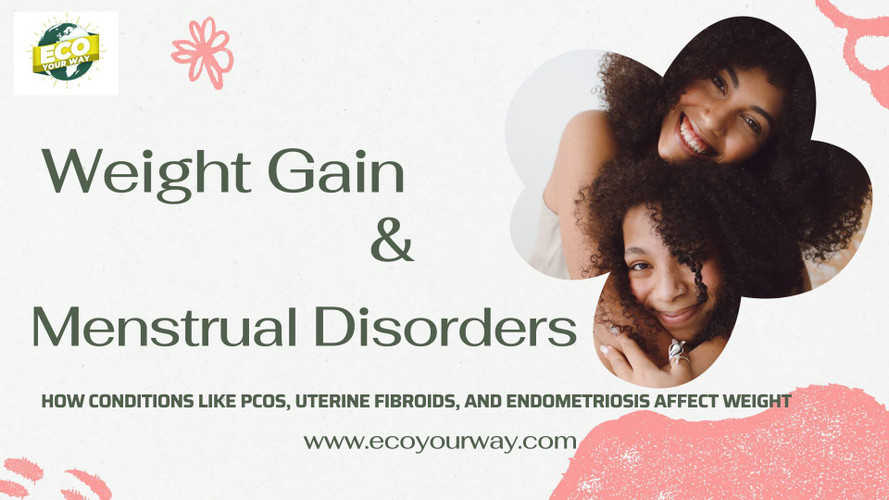Weight Gain and Menstrual Disorders: How Conditions Like PCOS, Uterine Fibroids, and Endometriosis Affect Weight
Oct 19th 2024
Weight gain is a common concern for many women, particularly those with certain menstrual disorders. Conditions like Polycystic Ovary Syndrome (PCOS), uterine fibroids, and endometriosis not only affect a woman's reproductive health but can also lead to significant weight changes. Understanding the connection between these conditions and weight gain is essential for managing both physical and emotional well-being. In this article, we’ll explore what these conditions are, why they contribute to weight gain, and offer nutritional guidance to help manage symptoms.
Understanding the Conditions
Polycystic Ovary Syndrome (PCOS)
PCOS is a hormonal disorder that affects up to 10% of women of reproductive age, making it one of the most common endocrine disorders among women. The Endocrine Society estimates that 5-6 million women in the United States are diagnosed with PCOS, while millions remain undetected. It is characterized by the presence of multiple cysts on the ovaries, irregular or absent periods, excess androgen (male hormone) levels, and insulin resistance. These hormonal imbalances can lead to symptoms such as acne, excessive hair growth (hirsutism), thinning hair, and infertility.
Uterine Fibroids
Uterine fibroids are non-cancerous growths that develop in or on the uterus. According to the American College of Obstetricians and Gynecologists, up to 80% of women will have fibroids by the time they turn 50. An article published by the American Family Physician states that black women have a higher prevalence of fibroids and severe symptoms compared to white women. While many women with fibroids may not experience symptoms, those who do often face heavy menstrual bleeding, pelvic pain, bloating, and a frequent need to urinate. Fibroids can also interfere with fertility. Hormone imbalance can affect your ability to maintain a healthy weight.
Endometriosis
Endometriosis is a chronic condition in which tissue similar to the lining of the uterus grows outside of the uterus, causing pain, irregular bleeding, and potentially infertility. Yale Medicine reported that approximately 1 in 10 women of reproductive age are affected by endometriosis, though it often takes years to receive a proper diagnosis. This condition can cause severe pelvic pain, painful periods, pain during intercourse, and digestive issues.
Co-occurrence of These Conditions
It’s important to note that some women can have more than one of these conditions at the same time. For example, research suggests that about 10-15% of women with endometriosis may also have PCOS. Fibroids can also coexist with both PCOS and endometriosis. Managing multiple conditions simultaneously can be especially challenging, as each one presents its own set of symptoms and treatment options.
Why Do Women with These Conditions Gain Weight?
1. Hormonal Imbalance
All three conditions involve hormonal imbalances that can contribute to weight gain. In PCOS, elevated levels of androgens (male hormones) can cause insulin resistance, which slows down metabolism and promotes fat storage. This is one of the main reasons why women with PCOS often experience weight gain, particularly around the abdomen.
With endometriosis, weight gain is less directly linked to hormonal changes but can occur due to the inflammation and pain associated with the condition. Chronic pain can affect a woman’s activity levels, leading to decreased physical activity, which in turn contributes to weight gain.
Fibroids can also be linked to weight gain, particularly because large fibroids can cause bloating, pelvic pressure, and discomfort, making physical activity more difficult. In some cases, fibroids may also contribute to hormonal imbalances that can influence metabolism.
2. Stress and Emotional Factors
Chronic conditions like PCOS, fibroids, and endometriosis often result in long-term stress, both physical and emotional. Chronic pain, infertility concerns, and heavy menstrual bleeding can affect mental health, leading to stress and even depression. High cortisol levels, a hormone produced during stress, can promote fat storage, particularly around the belly area.
3. Medications
Certain medications prescribed to manage symptoms of these conditions can contribute to weight gain. For example, women with PCOS who take oral contraceptives or medications like metformin may experience fluctuations in weight. Similarly, women with endometriosis might be prescribed hormonal treatments, which can also lead to changes in weight.
Nutrition and Weight Management for Women with Menstrual Disorders
While managing weight with menstrual disorders can be challenging, diet plays an important role in regulating hormones, reducing inflammation, and supporting overall health. Below are dietary recommendations for women managing PCOS, uterine fibroids, and endometriosis.
Foods to Eat
1. Lean Proteins: Protein helps regulate blood sugar and promote satiety. Opt for lean sources such as chicken, turkey, tofu, eggs, and fish.
2. Fiber-rich Vegetables: Vegetables high in fiber, like leafy greens (spinach, kale) and cruciferous vegetables (broccoli, cauliflower), can help regulate hormones and promote a healthy digestive system. Fiber also helps to balance blood sugar levels, an important consideration for women with PCOS.
3. Healthy Fats: Omega-3 fatty acids, found in fish like salmon, chia seeds, flaxseeds, and walnuts, have anti-inflammatory properties that can help manage the chronic pain associated with endometriosis. These fats also support hormone regulation.
4. Whole Grains: Foods such as quinoa, brown rice, oats, and whole wheat are rich in fiber, helping to keep blood sugar levels stable, especially important for those with PCOS. Whole grains also provide essential nutrients that support overall health.
5. Antioxidant-rich Fruits: Berries, cherries, and citrus fruits are high in antioxidants, which can help reduce inflammation and improve immune function. These fruits are particularly beneficial for women with endometriosis, as inflammation is a major issue with the condition.
Foods to Avoid
1. Refined Carbohydrates and Sugars: For women with PCOS, eating foods that cause rapid spikes in blood sugar—such as white bread, pasta, and sugary snacks—can worsen insulin resistance and contribute to weight gain.
2. Processed Meats: Processed meats like bacon, sausages, and deli meats contain high levels of sodium and preservatives that can contribute to bloating and inflammation, particularly in women with fibroids and endometriosis.
3. Dairy Products: Some women with endometriosis may find that dairy exacerbates their symptoms, especially since certain dairy products can cause inflammation. Additionally, high-fat dairy may promote the production of estrogen, which can worsen fibroid symptoms.
4. Caffeine and Alcohol: Both caffeine and alcohol can increase estrogen levels, potentially exacerbating conditions like fibroids and endometriosis. They can also disrupt sleep and contribute to stress, which in turn affects weight management.
Conclusion
Managing weight gain in the context of menstrual disorders like PCOS, uterine fibroids, and endometriosis can be challenging, but it is possible with the right approach. Understanding the underlying hormonal imbalances and inflammation involved in these conditions is key to addressing weight concerns. Nutrition plays an essential role in managing symptoms, balancing hormones, and promoting overall health. By focusing on whole, nutrient-dense foods, limiting processed options, and staying active when possible, women with these conditions can better manage their weight and improve their quality of life.
If you are struggling with weight gain due to any of these conditions, it’s important to consult a healthcare provider who can offer personalized treatment options, including dietary recommendations and medications. Each woman's journey is unique, and with the right strategies, it’s possible to achieve a healthier weight and improve long-term well-being.

